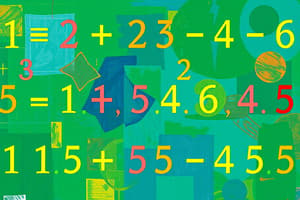Podcast
Questions and Answers
What is the definition of the least common multiple (LCM)?
What is the definition of the least common multiple (LCM)?
- The smallest negative integer that is a multiple of all the integers.
- The smallest positive integer that is a multiple of all the integers. (correct)
- The largest positive integer that is a multiple of all the integers.
- The largest negative integer that is a multiple of all the integers.
Which method can be used to find the LCM of two numbers?
Which method can be used to find the LCM of two numbers?
- Listing multiples (correct)
- Summation method
- Polynomial factoring
- Division method
What is true about the relationship between LCM and GCD of two numbers?
What is true about the relationship between LCM and GCD of two numbers?
- LCM(a, b) * GCD(a, b) = a * b (correct)
- LCM(a, b) + GCD(a, b) = a + b
- LCM(a, b) - GCD(a, b) = a / b
- LCM(a, b) * GCD(a, b) = a - b
What is the LCM of 1 and any integer?
What is the LCM of 1 and any integer?
Which statement about the LCM is always true?
Which statement about the LCM is always true?
How can the LCM of more than two numbers be found?
How can the LCM of more than two numbers be found?
What is an application of LCM in real life?
What is an application of LCM in real life?
Finding the LCM of which pairs gives a result of 12?
Finding the LCM of which pairs gives a result of 12?
Flashcards
LCM of two integers
LCM of two integers
The smallest positive integer that is a multiple of both integers.
Finding LCM by listing multiples
Finding LCM by listing multiples
List multiples of each number until a common multiple is found. The smallest is the LCM.
Finding LCM by prime factorization
Finding LCM by prime factorization
Find the prime factors of each number. The LCM is the product of highest powers of each prime factor.
LCM and GCD relationship
LCM and GCD relationship
Signup and view all the flashcards
LCM of relatively prime numbers
LCM of relatively prime numbers
Signup and view all the flashcards
LCM properties: always greater than or equal to greatest number
LCM properties: always greater than or equal to greatest number
Signup and view all the flashcards
LCM of 1 and any integer
LCM of 1 and any integer
Signup and view all the flashcards
LCM of more than 2 numbers
LCM of more than 2 numbers
Signup and view all the flashcards
Study Notes
Definition and Concept
- The least common multiple (LCM) of two or more integers is the smallest positive integer that is a multiple of all the integers.
- It's the smallest number divisible by all the given numbers without any remainder.
Finding the LCM
- Methods for finding the LCM include:
- Listing multiples: List multiples of each number until a common multiple is found. The smallest is the LCM.
- Prime factorization: Find the prime factorization of each number. The LCM is the product of the highest power of each prime factor found in any factorization.
- Using the relationship with the greatest common divisor (GCD): The product of two numbers equals the product of their LCM and GCD.
- LCM(a, b) * GCD(a, b) = a * b
Properties of LCM
- The LCM of two or more integers is always greater than or equal to the greatest of the integers.
- The LCM of 1 and any integer is the integer itself.
- The LCM of two relatively prime numbers (common factors only 1) is their product.
- The LCM of two numbers is always divisible by both of the numbers.
Examples
-
Finding the LCM of 4 and 6:
- Multiples of 4: 4, 8, 12, 16, ...
- Multiples of 6: 6, 12, 18, 24, ...
- The smallest common multiple is 12. Therefore, LCM(4, 6) = 12.
-
Finding the LCM of 12 and 18 using prime factorization:
- Prime factorization of 12: 2² * 3
- Prime factorization of 18: 2 * 3²
- Highest power of 2: 2²
- Highest power of 3: 3²
- LCM(12, 18) = 2² * 3² = 4 * 9 = 36.
-
Finding the LCM of 8 and 12 using the relationship with GCD:
- GCD(8, 12) = 4
- LCM(8, 12) = (8 * 12) / GCD(8, 12) = (8 * 12) / 4 = 96 / 4 = 24
Applications of LCM
- Scheduling: Determining the frequency of events occurring at regular intervals.
- Fraction operations: Finding a common denominator for adding or subtracting fractions.
- Number theory problems: Solving problems involving multiples of numbers.
- Finding the time when two events occur simultaneously.
LCM of more than two numbers
- To find the LCM of more than two numbers, use prime factorization. Identify the highest power of each prime factor in any of the factorizations.
- Example: Finding LCM(6, 8, 10)
- Prime factorization of 6: 2 * 3
- Prime factorization of 8: 2³
- Prime factorization of 10: 2 * 5
- Highest power of 2: 2³
- Highest power of 3: 3¹
- Highest power of 5: 5¹
- LCM(6, 8, 10) = 2³ * 3 * 5 = 8 * 3 * 5 = 120
Distinguishing from GCD
- GCD (greatest common divisor) is the largest factor common to two or more numbers.
- LCM is the smallest multiple common to two or more numbers.
- GCD is concerned with common factors.
- LCM is concerned with common multiples.
Studying That Suits You
Use AI to generate personalized quizzes and flashcards to suit your learning preferences.



